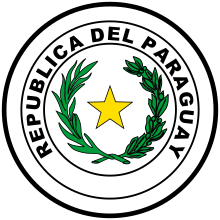
The culture of Paraguay reflects the Spanish and indigenous influences of the country. Paraguay's cultural heritage can be traced to the extensive intermarriage between the original male Spanish settlers and indigenous Guaraní women. Their culture is highly influenced by various European countries, including Spain. Therefore, Paraguayan culture is a fusion of two cultures and traditions; one European, the other, Southern Guaraní. More than 93% of Paraguayans are mestizos, making Paraguay one of the most homogeneous countries in Latin America. A characteristic of this cultural fusion is the extensive bilingualism present to this day: more than 80% of Paraguayans speak both Spanish and the indigenous language, Guaraní. Jopara, a mixture of Guaraní and Spanish, is also widely spoken.[citation needed]
This cultural fusion is expressed in arts such as embroidery (ao po'í) and lace making (ñandutí). The music of Paraguay, which consists of lilting polkas, bouncy galopas, and languid guaranias is played on the native harp. Paraguay's culinary heritage is also deeply influenced by this cultural fusion. Several popular dishes contain manioc, a local staple crop similar to the yuca also known as Cassava root found in the Southwestern United States and Mexico, as well as other indigenous ingredients. A popular dish is sopa paraguaya, similar to a thick corn bread. Another notable food is chipa, a bagel-like bread made from cornmeal, manioc, and cheese. Many other dishes consist of different kinds of cheeses, onions, bell peppers, cottage cheese, cornmeal, milk, seasonings, butter, eggs and fresh corn kernels.
The 1950s and 1960s were the time of the birth of a new generation of Paraguayan novelists and poets such as José Ricardo Mazó, Roque Vallejos, and Nobel Prize nominee Augusto Roa Bastos. Several Paraguayan films have been made.
Inside the family, conservative values predominate. In lower classes, godparents have a special relationship to the family, since usually, they are chosen because of their favorable social position, in order to provide extra security for the children. Particular respect is owed them, in return for which the family can expect protection and patronage.[1]
- ^ "Paraguay – Ritual Kinship". countrystudies.us. Archived from the original on 3 November 2016. Retrieved 30 January 2018.